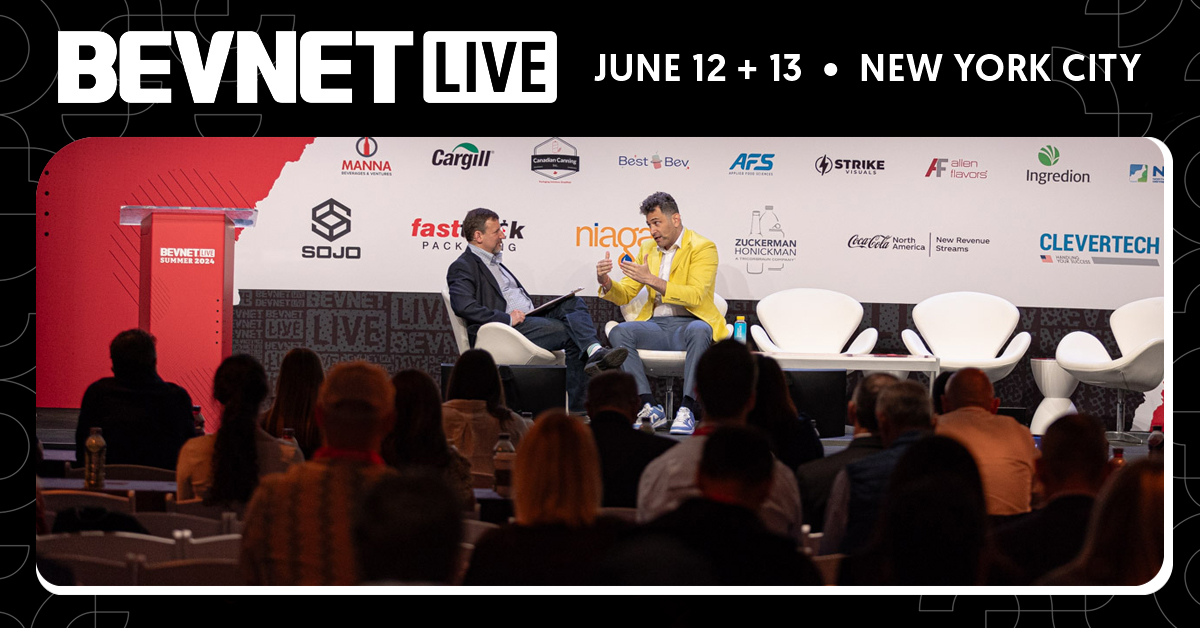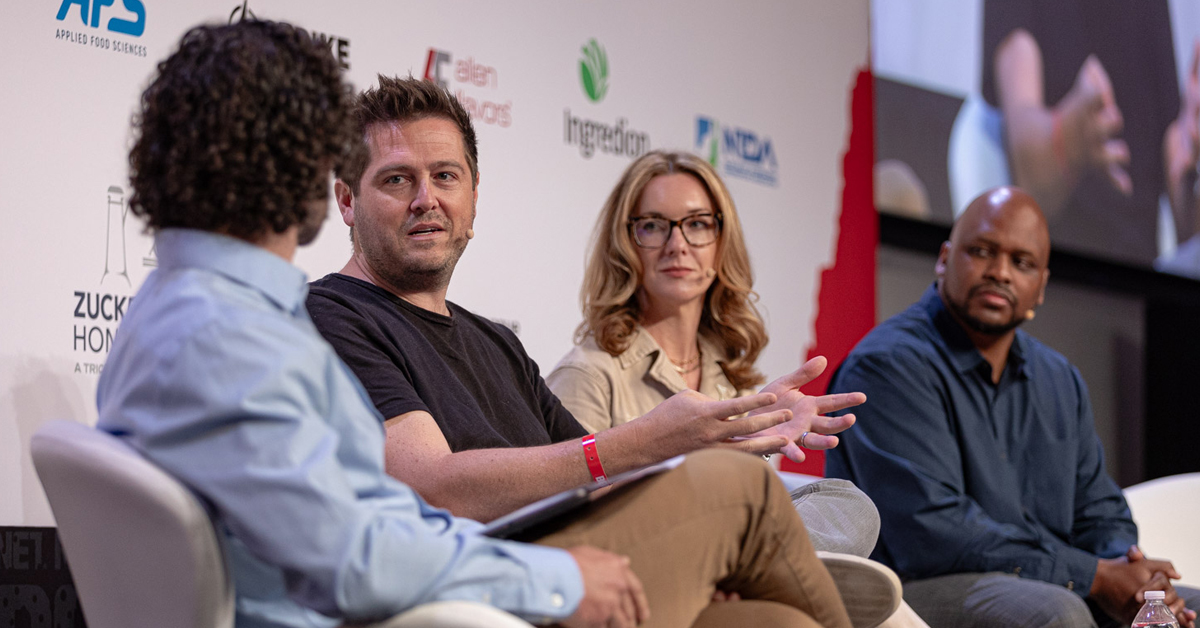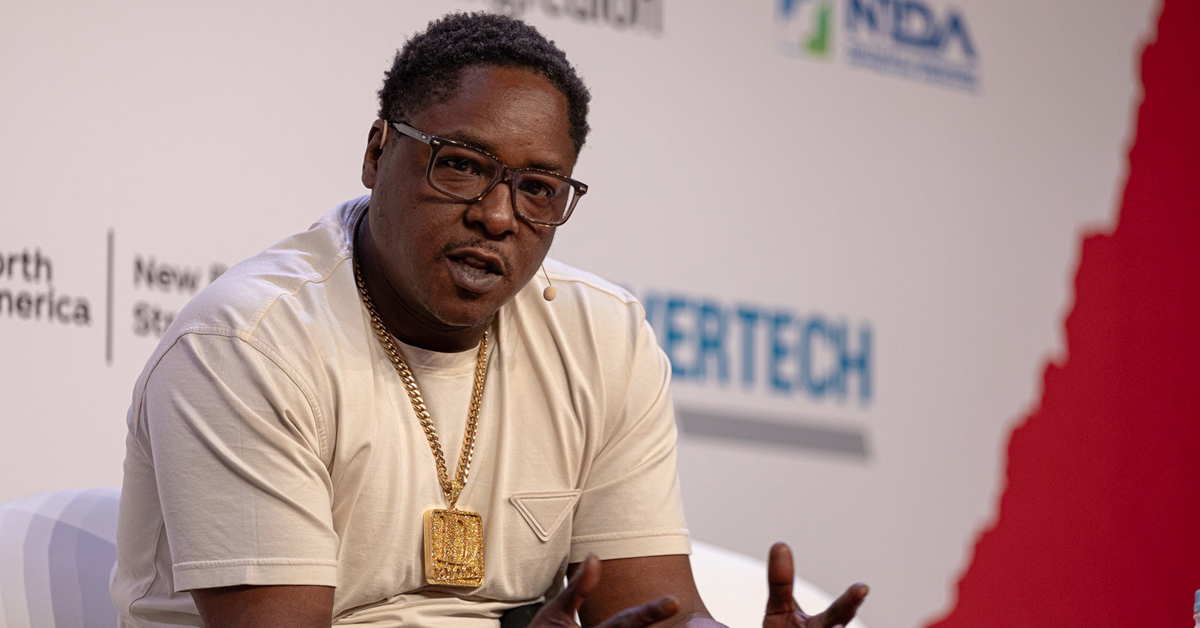
BevNET Live Summer 2024 kicked off in New York City on Wednesday with a wide range of discussions and insights shared by top players and key individuals in the beverage business. Day one brought everything from tactical discussions on navigating emerging challenges as a first-time entrepreneur and how to embrace novel marketing opportunities to insight into the current climate for investment and much more.
Tough Calls And Key Moments At Lemon Perfect
Yanni Hufnagel, founder and CEO of Lemon Perfect, came to the beverage business without ever having played the game, but a background in coaching college basketball helped prepare him to make tough calls at key moments that have allowed the business to keep going, he said during day one of BevNET Live.
“There’s a lot more that goes into this than just jumping up and down and meeting with distributor and retail partners,” Hufnagel said. “I’ve never run a business before, [but] there is great entrepreneurial utility in my past. There’s probably nothing more important than recruiting great talent and retaining it.”
Hufnagel shared how he grew the company from a nascent idea to a team of over 90 employees and a business that has brought in over $90 million in funding. There was even a time, only two years in, that Hufnagel had seriously considered hiring a CEO to take over, and shared the story of why he ultimately backed out of the agreement due to one comment from early investors: “We bet on you.”
Since then, the flavored water brand has caught the attention of notable investors, including Beyonce and NBA players such as Spencer Dinwiddie and Blake Griffin, just to name a few. But Hufnagel emphasized the amount of pressure that comes after raising even a single dollar of capital makes it all the more essential that the business has a solid roadmap. Lemon Perfect’s own cap table now spans over 300 individuals. With all of those eyes and interests involved, making any major decisions comes with a greater risk.
But the brand has embraced plenty of risk in recent years and continues to grow. Lemon Perfect managed to pivot from its original, refrigerated formulation that was merchandised in the produce set, to a shelf-stable liquid that now competes on the flavored water shelf. That wasn’t the only recent, monumental shift the brand has executed. After a “failed” launch at 7-Eleven in the greater Los Angeles area, Hufnagel said the team recognized that there was one big piece of the brand that was holding it back: its bottle size.
That pushed Lemon Perfect to go bigger. In November, the brand sized up its vessel from a 12 oz. slim plastic bottle to a 15.2 oz. container. The shift not only led to more value on the consumer end, Hufnagel noted, but higher dollar profits for the brand as well as its distribution and retail partners.
Additionally when news broke around potential health risks associated with alt-sweetener erythritol, Hufnagel said he spent weeks working to reformulate the liquid. Once all changes were said and done, Lemon Perfect’s SRP rose from $1.99 to $2.29 and Hufnagel said homing in on the business’s strategic priority – to sell as many bottles as possible – became essential to executing its mission of “democratizing drinkable wellness.”

Building the NA Category
As the non-alcoholic beverage category has matured, the role of independent brands and specialty retailers has become increasingly important to educate new consumers who range from the “sober serious, to the sober curious, with a hundred points in between,” joked Chris Marshall, founder of Sans Bar, during a panel discussion at BevNET Live.
“You can buy cheese anywhere, but cheesemongers know what they are doing,” Marshall later said while emphasizing there is a need for more informed and passionate consumer-facing individuals within both brands and bottle shops if the category is going to become mainstream.
Marshall was joined by Emily Heintz, founder and chief curator at NA wine and spirits brand Sèchey and Nick Bodkins, CEO and founder of Boisson. Heintz spoke about how Sèchey’s recent collaboration with Target, where it has established a dedicated set for no-to-low alcoholic cocktail brands, has served as a spark plug to the overall category’s growth.
But for Boisson, Bodkins emphasized that retail was the hardest part of the brand’s three-pronged business, which also included online sales and wholesale. He outlined the high costs of operating the brand’s physical locations that ultimately contributed to it’s Chapter 11 bankruptcy filing and restructuring in April.
“I am not apologetic about the things that we started to do, I am really upset at myself for not being able to pivot faster,” Bodkins said. “But I think there is a second wave of how NA shows up in retail and it’s going to be written by people like Emily [Heintz] and by us as well to help retailers understand this category.”
Bodkins shared that after spending “eight weeks in [his] attic trying to find a way through] he has landed on a way to recapitalize the business via a partner that “believes in what we are building.” While he could not share full details on the path ahead, Bodkins said rebuilding trust will be essential as it reestablishes Boisson in the NA space.
“We are going to work really hard to make it right with suppliers,” Bodkins said. “We’re also going to work really hard to introduce the categories of millions of people that are trying it for the first time and who have no idea of the nuances of what we’re talking about here at BevNET Live in New York City.”

Sports Marketing Evolution
The emergence of Name, Image and Likeness (NIL) deals has opened up new opportunities to tap into a new kind of influencer and build within a regional consumer base, explained Manny Lubin, co-founder of Slate Milk, and Andrew Mavis, founder and CEO 98Strong. Marketing via college athletes not restricted to athletic-positioned brands, Mavis and Lubin emphasized, explaining that these relationships can be seen almost as an alternative to traditional micro or macro influencer campaigns.
“You can drive their followers and all those college consumers to those [nearby] retailers to generate support. Therefore the authenticity is there and the audience is directly who you want to target,” Mavis said.
Though the audience may be there, Mavis and Lubin explained that in order for NIL deals to be successful, you have to have a sound strategy with meaningful milestones in order to measure the success of different partnerships. Later, Mubarak Malik, CEO and founder of barcode, took to the stage to share how to execute successful partnerships within the professional space and was joined by the brand’s most recent collaborator, rapper Jadakiss.
Additional Highlights From Day One:
- During the opening State of the Market session, Charlie New, global category manager of refrigerated beverage at Whole Foods Market; Sahra Nguyen, CEO of Nguyen Coffee; Ryan Williams, founder of FABID; and Patrick English owner and VP of Dana Distributors, Inc., discussed how to navigate the challenge of building and scaling within the beverage business, particularly when investors are “tightening their purse strings.”
- Eric Gorli, chief commercial officer at Keurig Dr Pepper, spoke about how the multinational conglomerate approaches partnerships to ensure it is playing in high growth spaces and continuing to create value within its portfolio.
- Bader Alam, founder and managing partner of Full Frame Growth Partners, shared untold strategies for raises and exits early in the day. Alam said that when deal flow is down, the appetite for growth equity opens up. He also emphasized that the focus also shifts beyond just EBITDA to free cash flow and emphasized the scarcity value of good businesses that have managed to stretch their cash or raise internally continues to go up during tough times.
- Diageo Ventures’ Sallie Jian, who works on emerging brands, investment and growth, shared details on her path to Diageo including the areas of investing she focused on previously that teed her up to take on this new area of expertise under the spirits giant.
- Reza Mirza, Group CEO of Icelandic Glacial, emphasized the importance of saving every cent wherever you can. Mirza shared details how the brand has created viral marketing campaigns with low budgets and iPhone videography. Beyond brand building efforts, that mindset is also important when it comes to architecting channel growth.